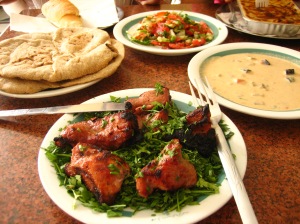Although the Egyptian cuisine has been influenced over the years by surrounding countries, many of the most popular foods in Egypt today were popular and beloved by ancient Egyptians many years ago. Some of these dishes include molokhiyya (a spinach-like vegetable) and ful mudammas (cooked, creamy fava beans). A large portion of Egypt’s economy is attributed to agriculture. Due to Egypt’s proximity to the Nile, it is able to grow major crops, such as sugar cane, barley, wheat, corn, cotton, and rice; which is why a large part of an Egyptians diet consists of wheat products and bean products. Meat is considered a luxury to most Egyptians due to its high price and is eaten only during special holidays or occasions. Due to religious beliefs, a majority of Egyptians don’t partake in the eating or drinking of beef, pork or alcohol.
Ramadan:
Since about 90% of the Egyptian population is Muslim, a majority of Egyptians celebrate the holiday known as Ramadan. This holiday usually takes place during the ninth month of the Islamic calendar, usually November or December, and during this month, Muslims fast from sunrise to sunset. When the sun sets, families come together to feast on hearty meals and to enjoy time with family. At the end of the holiday, family’s partake in a three day long “great feast” where an animal, usually a lamb, is roasted whole over a fire and meat is usually given to poorer families.
Mealtime Customs:
When invited into an Egyptians home for a meal, there are several customs one might follow. Food must never be touched by the left hand because it is considered to be unclean, guest’s should bring a small gift for the hosts such as flowers or chocolate, and compliments should always be made to the cook. Dinner is usually served around 9 to 10pm but a non-alcoholic cocktail hours usually occurs before the meal in order for socializing. After the meal, guests usually move into another room to enjoy more socializing accompanied by mint tea or coffee.
Read More:
